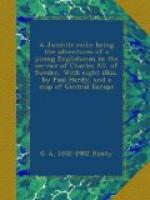“But the Poles have their virtues. They love their country, and are ready to die for her. They are courteous, and even chivalrous, they are hospitable to an excess, they are good husbands and kindly masters, they are recklessly brave; and, if they are unduly fond of finery, I, who supply so many of them, should be the last to find fault with them on that score. They are proud, and look down upon us traders, but that does not hurt us; and, if they were to take to trading themselves, there would be no place for us here. But this has nothing to do with our present purpose.
“Certainly, if it was a question of Polish affairs, neither the foreign nor the Jewish merchants here would move a finger one way or the other. We have everything to lose, and nothing to gain. Suppose we took sides with one of the parties, and the other got the upper hand. Why, they might make ordinances hampering us in every way, laying heavy taxes on us, forbidding the export of cattle or horses, and making our lives burdensome. True, if they drove us out they would soon have to repeal the law, for all trade would be at an end. But that would be too late for many of us.
“However, I do not say that, at the present time, many would not be disposed to do what they could against Augustus of Saxony. We are accustomed to civil wars; and, though these may cause misery and ruin, in the districts where they take place, they do not touch us here in the capital. But this is a different affair. Augustus has, without reason or provocation, brought down your fiery King of Sweden upon us; and, if he continues on the throne, we may hear the Swedish cannon thundering outside our walls, and may have the city taken and sacked. Therefore, for once, politics become our natural business.
“But, though you may find many well wishers, I doubt if you can obtain any substantial aid. With Saxon troops in the town, and the nobles divided, there is no hope of a successful rising in Warsaw.”
“The king did not think of that,” Charlie said. “His opinion was, that were it evident that the citizens of Warsaw were strongly opposed to Augustus of Saxony, it would have a great moral effect, and that, perhaps, they might influence some of the nobles who, as you say, are deeply in their books, or upon whose estates they may hold mortgages, to join the party against the king.”
“They might do something that way,” Allan Ramsay agreed. “Of course, I have no money out on mortgages. I want badly enough all the money I can lay hands on in my own business. Giving credit, as we have to, and often very long credit, it requires a large capital to carry on trade. But the Jews, who no doubt do hold large mortgages on the land, cannot exert much power. They cannot hold land themselves, and, were one of them to venture to sell the property of any noble of influence, he would be ruined. The whole class would shrink from him, and, like enough, there would be a tumult got up, his house would be burned over his head, and he and his family murdered.




